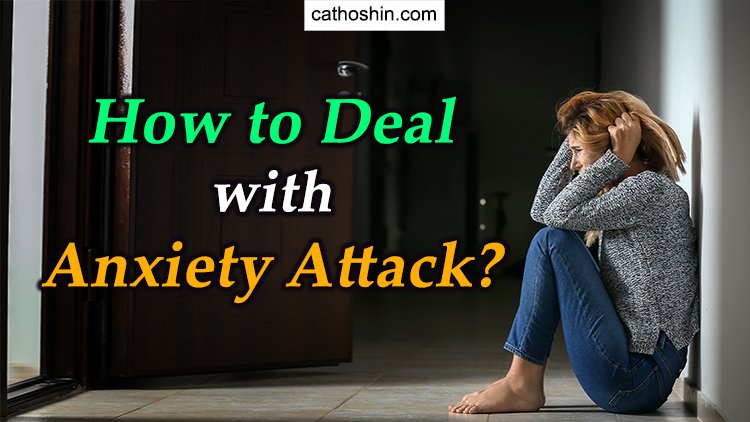How to Deal with Anxiety Attack? (With 12 Effective Ways)
Anxiety attacks, also known as panic attacks, are episodes of intense panic or fear that usually occur all of sudden. It may leave you a feeling of chest tightness, heart palpitations, shortness of breath, dizziness, and muscle stiffness. You may even have negative thoughts and intense stress.
These symptoms last from a few minutes to several hours.
So, how to deal with anxiety attack?
Find out the answer in the following…
Table of Contents
12 Simple Ways to Deal with Anxiety Attack

1. Get to know the symptoms better
It’s better to know what anxiety attacks are like. If you’re familiar with the symptoms, you’ll get through it more easily. It’s hard to describe how scary a panic attack could be with words if you haven’t experienced it.
Read more: Guide to help someone with depression and anxiety
Someone suffering from the anxiety attack will find themselves dying, going crazy, or losing control in some way. Aside from the common symptoms mentioned at the beginning, you will have a feeling of nausea, sweating, and being disconnected from the reality.
2. Don’t quickly conclude it as anxiety attack
People often mistake this for a stroke or heart attack, and vice versa. Back then a member of my family was brought back from the emergency room with a diagnosis of panic attack; however, it later turned out that he actually had a heart attack. So, for the better, those who claim themselves being under anxiety attacks should have a complete medical check-up.
Ways to know you’re having anxiety!
3. Be aware of your emotions
It’s not easy to be with someone who is in a state of extreme distress. Be mindful of your thoughts and feelings, such as fear or helplessness. Being aware of what you’re going through can help you focus on the other person better.
See also: Are soulmates real?
4. The fear only lasts a short time
Fortunately, our nervous system can self-regulate, so what goes up will also go down.
The anxiety will gradually subside within 10 minutes or earlier (although a state of extreme panic may last longer). So, knowing that panic has the limit and enables to regulate itself is good for you in dealing with anxiety attacks.
5. Speak calmly and confidently
When the anxiety seems to occur, it is better to act calmly. Make it clear to the other person that you’re not worried about their panic. Your voice can be just as important as the words you use. A soft voice conveys confidence and set their parasympathetic nervous system back to normal.
6. Don’t try to stop the panic
It is understandable that you want the anxiety attack from someone to stop immediately. Nevertheless, be careful not to give them a sense of urgency that they should stop being panic right away. That behavior of yours could make them more upset, and it won’t be helpful for your relationship.
Tell yourself that the more you resist panic, the more it increases.
7. Don’t tell them to calm down
While dealing with anxiety attack, you may be tempted to ask the person to “calm down” or “relax” especially if you are upset by their anxiety.
But no one wants to be calm more than the person who is suffering from the panic. That’s all they want in that moment; therefore, keep telling them to calm down can only worsen the situation.
Instead, try to communicate to make them notice your presence and support.
8. Forget about the paper bag
You may have heard about the tip of breathing into a paper bag for panic individuals. Does it really work? This method was once recommended as an effective way to avoid the rapid breathing that can cause panic.
But, according to some, it doesn’t seem to be always effective.
Much worse, this is dangerous if that person is having asthma attack or a heart attack (not actually panicking). it can also make them believe that a paper bag can help them survive anxiety attacks.
9. Encourage them to connect to the world outside
If you want to help someone you know within a short time, how about encourage them to go outside and connect to all kinds of interesting things in life?
The root of panic is often quite unfounded. Try asking them to feel the world outside, such as telling them to drop your feet onto the floor. In general, a better awareness of the physical senses can switch their thoughts from disaster scenarios back to the panic situations on a daily basis.
10. Ask them to talk outside
Movement is good for people having anxiety attacks.
Ask the person to stand up with you, walk around, swing their arms and legs. If they refuse to do it, then don’t insist on making them do it.
11. Only touch them if they allow
Some will feel comfortable in the midst of panic if being hugged or patted by others, while some feel suffocated or constricted. Ask them first to determine what’s right for them – from hugs to respectful distance.
12. Take them to meet the expert
Always seek medical advice if you are unsure whether your symptoms or someone else’s are the symptoms of an anxiety attack. It’s important to make sure that none of any recurring physical symptom relates to an illness.
In Conclusion
So, how to deal with anxiety attack?
Excessive anxiety can lead to panic attacks that seriously affect your mental health. Most panic attacks happen so suddenly that they are difficult to prevent. However, there are a few things you can do to reduce the risk of panic attacks in others as well as yourself, such as: eating a balanced, nutritious diet, getting enough sleep, reducing stress by meditation, music, etc., and more.
Monitor your health regularly and maintain a healthy lifestyle to boost your mood as well as reduce the risk of panic attack.
For more questions about this topic, leave your comments below.





Leave a Reply